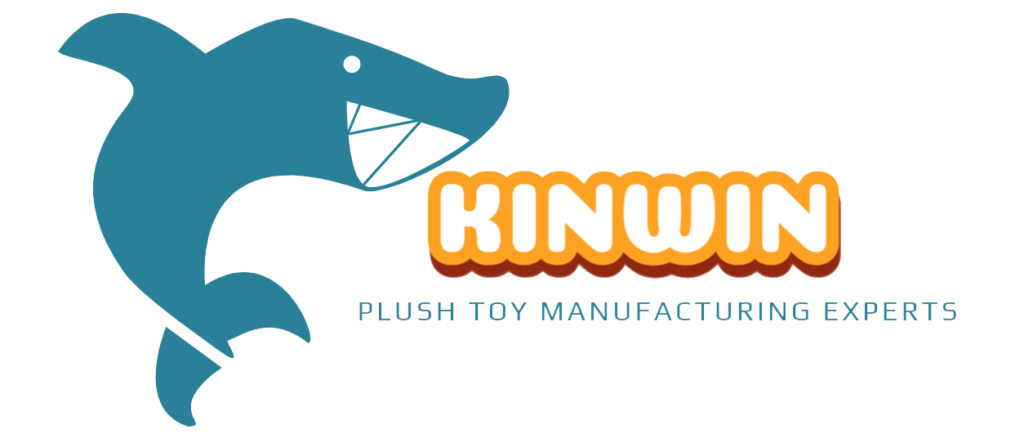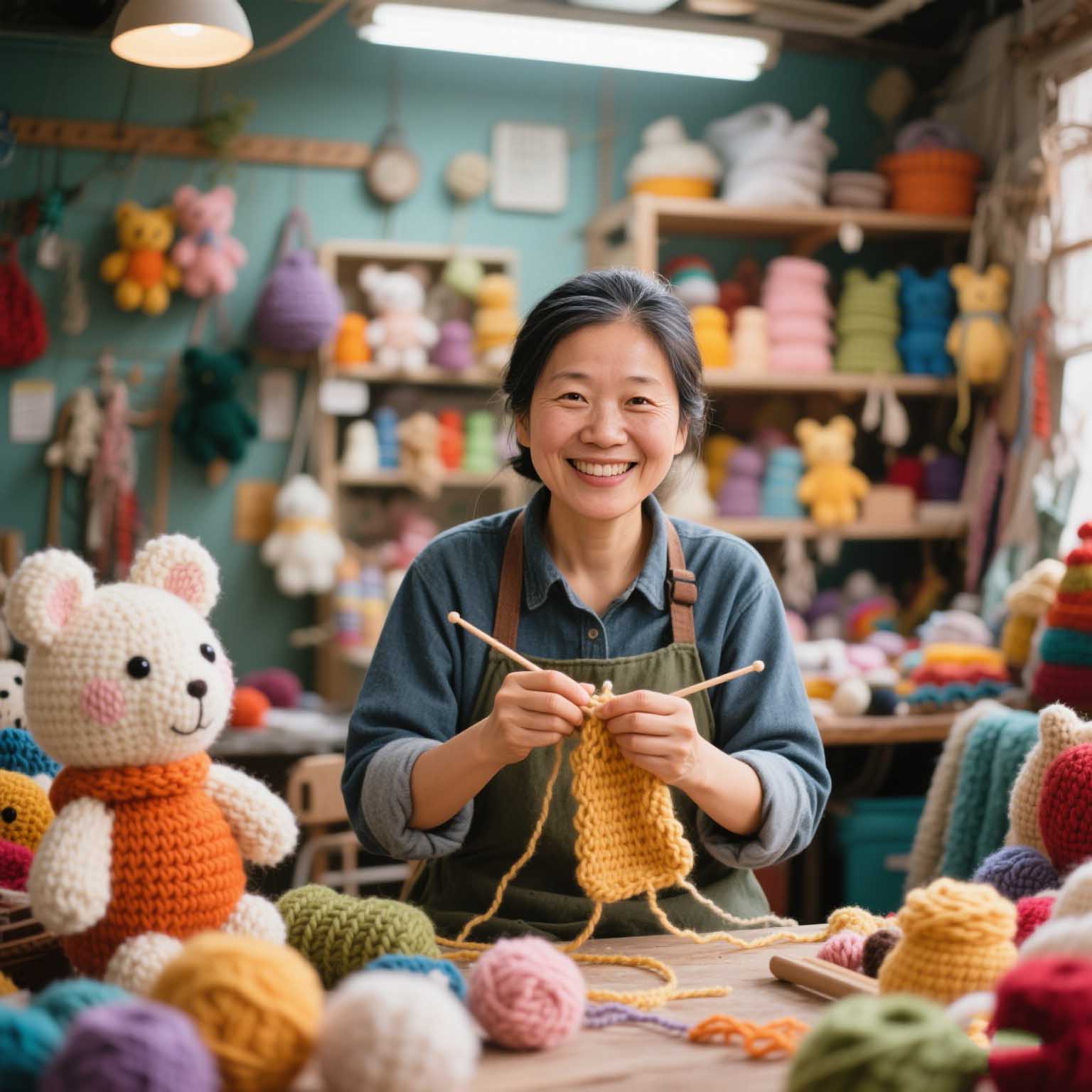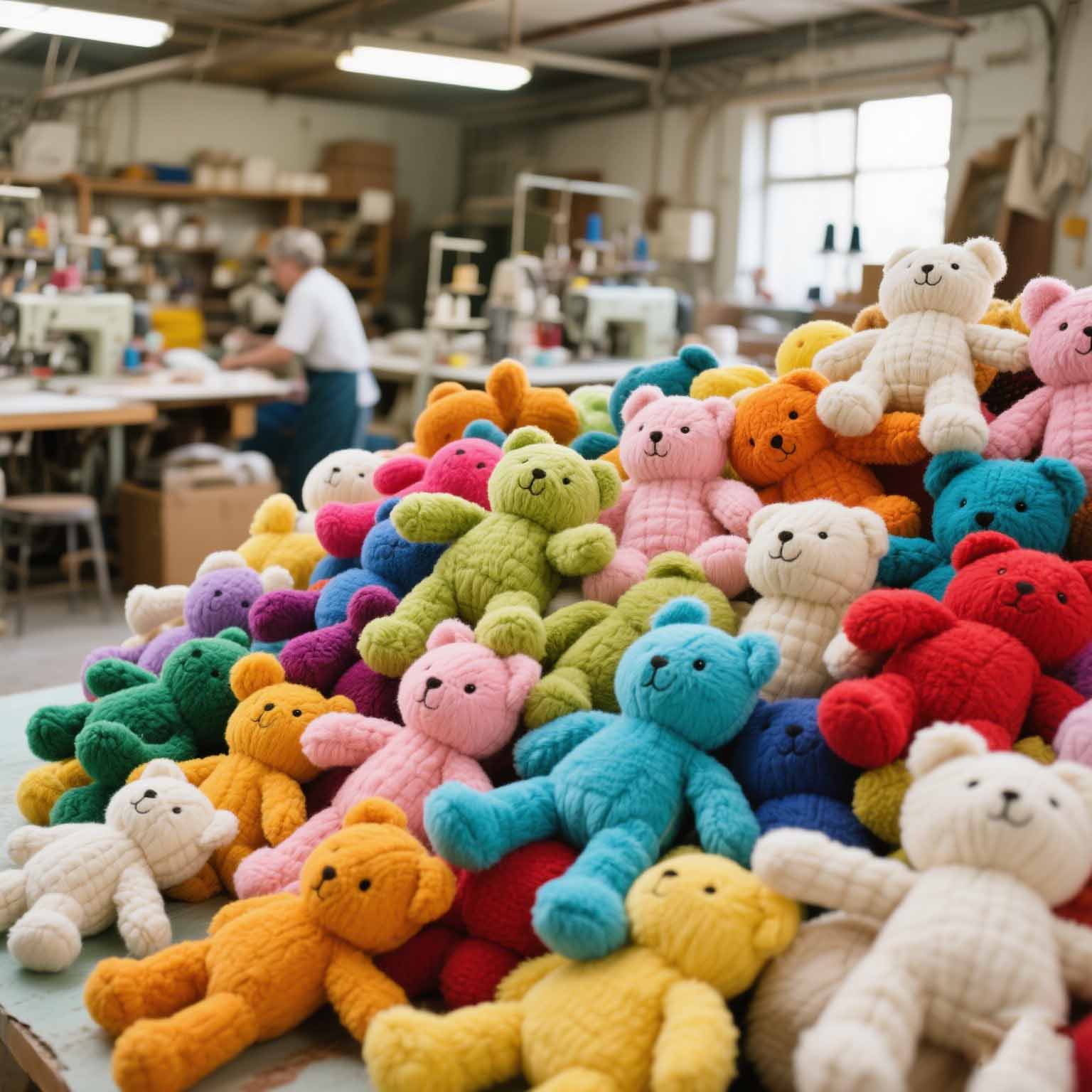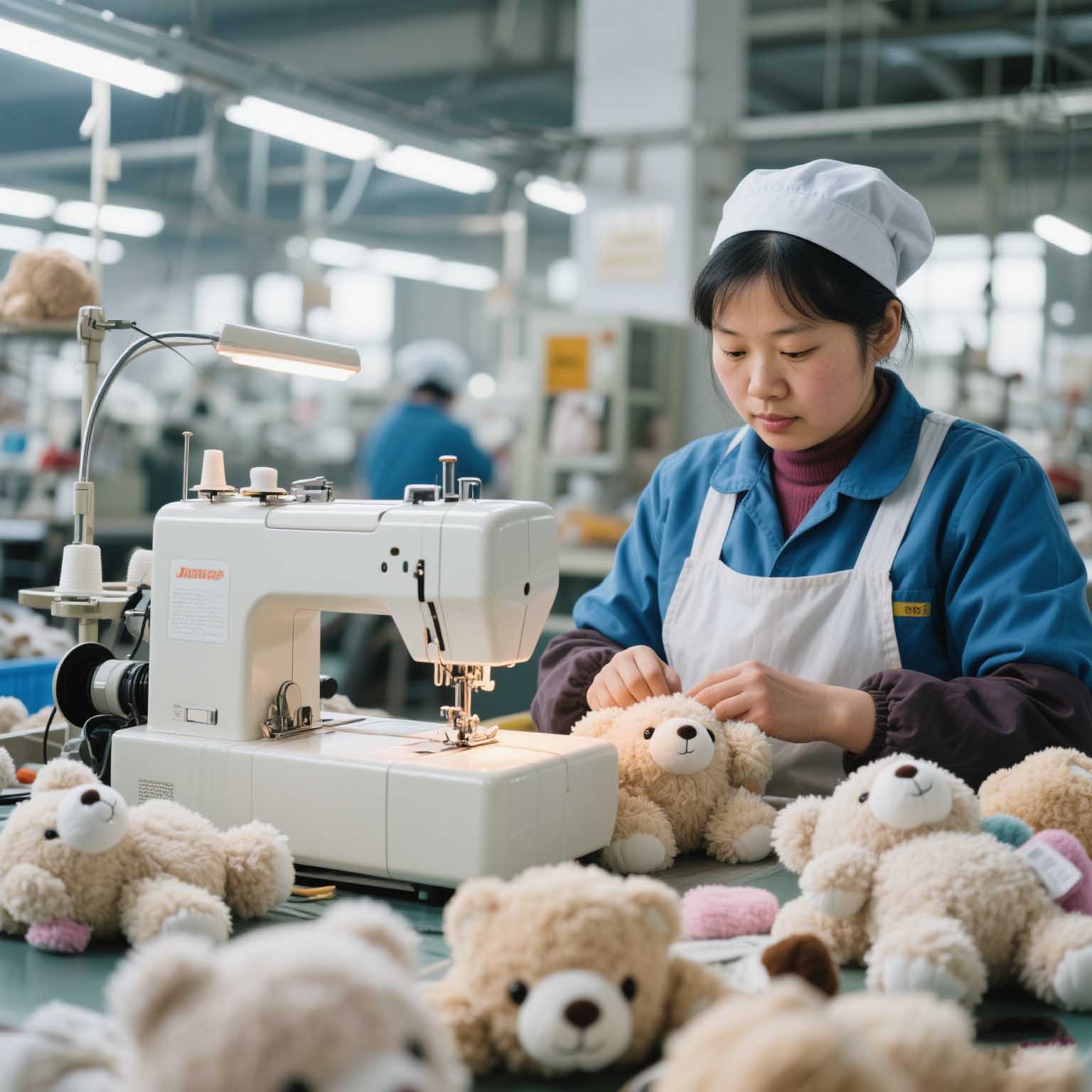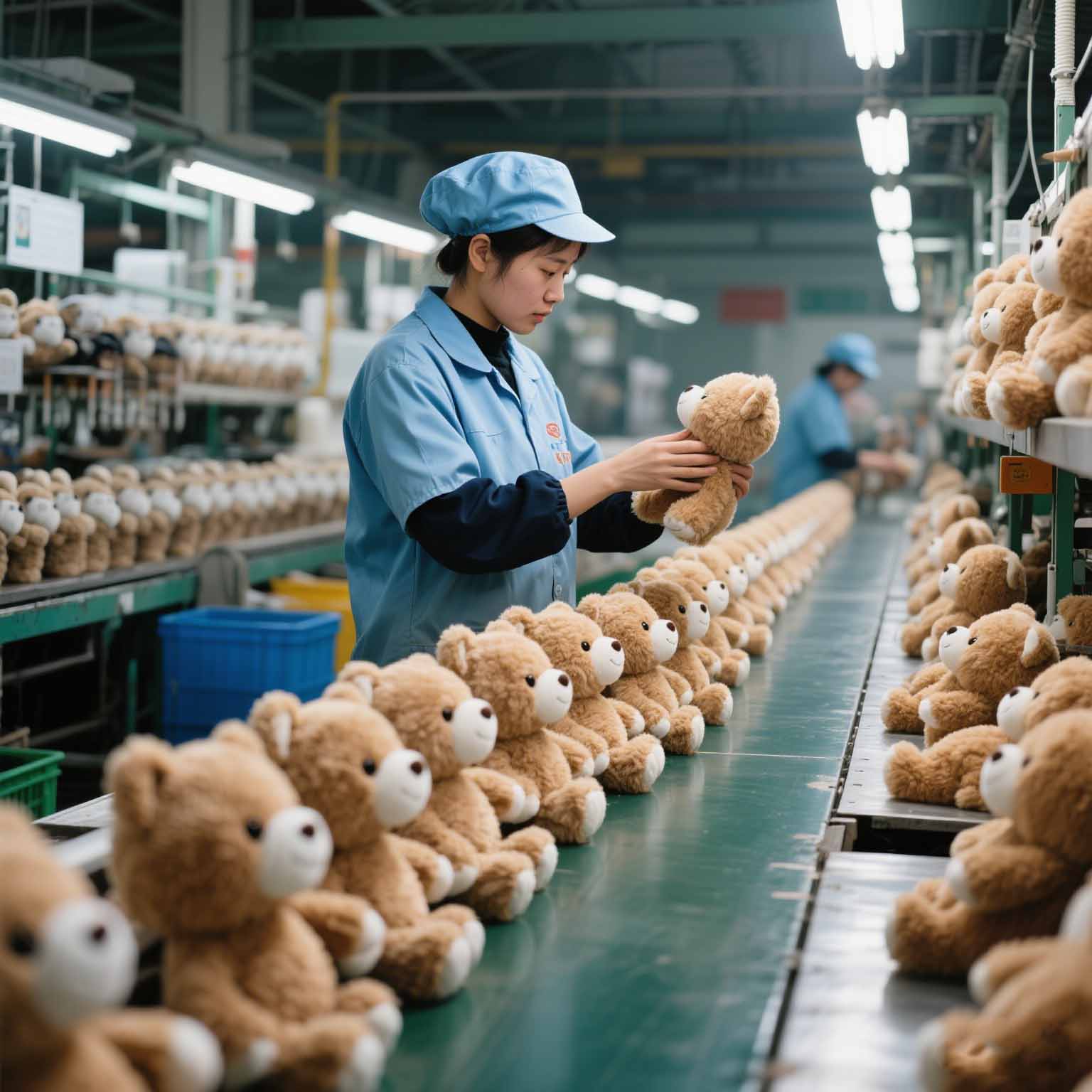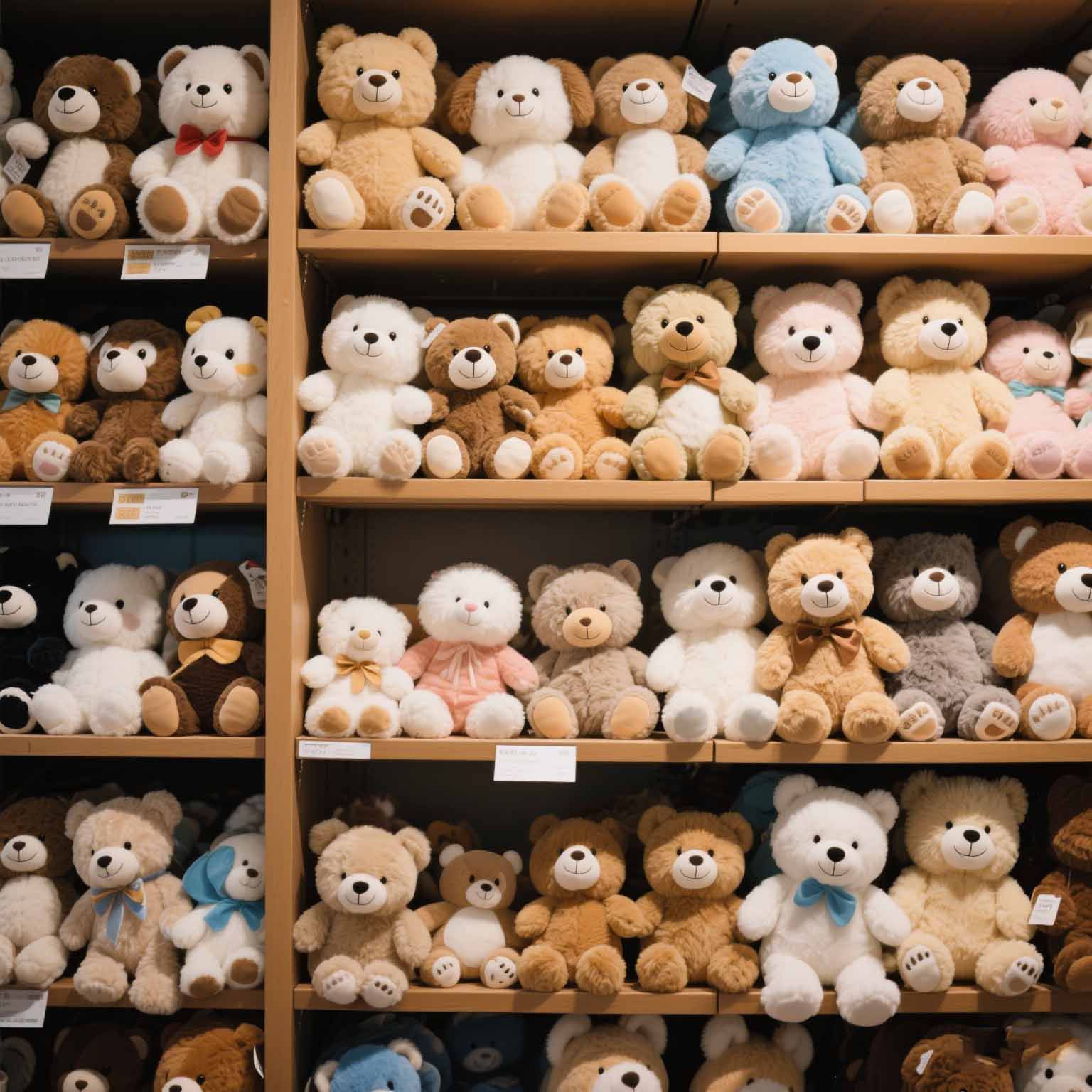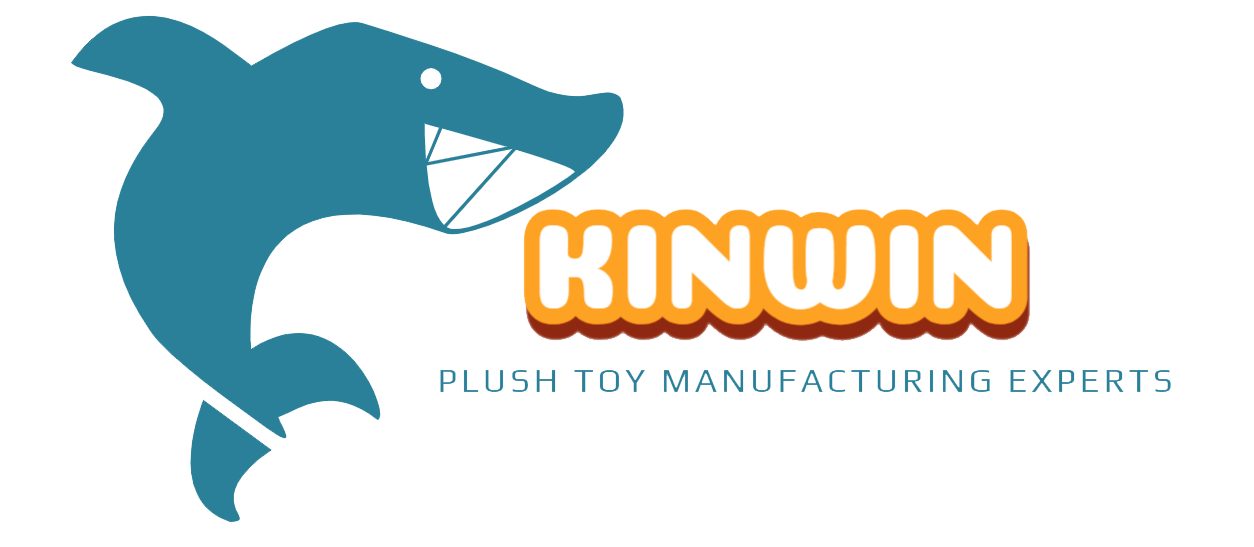Introduction
Creating plush toys that kids love shouldn’t come at the cost of exploited workers or a damaged planet. Yet, many brands struggle to balance quality, ethics, and affordability in their supply chains.
Through Kinwin’s Crochet Initiative, we’re redefining ethical plush toy manufacturing by empowering artisans with fair wages and using eco-friendly materials like organic cotton. This article dives into how these efforts foster sustainability and inspire ethical brands to make a difference.
The Heart of Kinwin’s Crochet Initiative
Kinwin’s Crochet Initiative is more than just a business venture—it’s a movement to empower artisans and bring ethical plush toy manufacturing to the forefront. Launched with a vision to create sustainable plush toys, Kinwin partners with skilled crochet artisans to craft toys that tell a story. This initiative blends creativity, sustainability, and fair trade practices to redefine how plush toys are made.
Origins of Kinwin’s Ethical Manufacturing Vision
Kinwin’s journey began with a simple idea: make toys that do good for people and the planet. Frustrated by mass production’s environmental toll, the company turned to handcrafted methods. By focusing on ethical plush toy manufacturing, Kinwin ensures artisans earn fair wages while using eco-friendly materials. This vision has built a brand that stands for quality and conscience.
How the Crochet Initiative Empowers Artisan Communities
The Crochet Initiative connects artisans, mostly women in rural areas, with global markets. Kinwin provides training, tools, and consistent work, helping them achieve financial independence. Artisans create Fair Trade plush toys, like soft animals and dolls, with pride. This empowerment fosters stronger communities, as artisans reinvest earnings into education and local businesses.
“Kinwin’s Crochet Initiative empowers artisans by offering fair wages and sustainable work, creating toys that reflect both craftsmanship and care for the planet.”
The Role of Storytelling in Connecting Consumers to Artisans
Every toy comes with a story—literally. Kinwin attaches tags sharing the artisan’s name and inspiration behind each piece. This storytelling builds a bond between consumers and creators, making sustainable plush toys feel personal. Customers love knowing their purchase supports real people, not faceless factories, which is why Kinwin’s toys resonate with ethically-minded buyers.
Overview of Kinwin’s Commitment to Sustainability
Sustainability is at Kinwin’s core. The company uses organic cotton, recycled fibers, and non-toxic dyes to craft its toys. By prioritizing eco-friendly materials, Kinwin reduces waste and environmental impact. Curious about how to make ethical plush toys? Kinwin’s approach shows it’s about choosing materials and methods that respect both nature and artisans.
Kinwin’s unique selling proposition lies in combining artisan empowerment with green production. This appeals to brands seeking socially responsible partners. The initiative’s Fair Trade certifications and eco-friendly materials also attract consumers who value transparency. It’s no wonder Kinwin is a “game-changer” in the plush toy industry.
Still, challenges exist. Sourcing sustainable materials can be costly, and training artisans takes time. Yet, Kinwin tackles these hurdles by building long-term supplier relationships and investing in community growth. The result? Toys that are as meaningful as they are adorable.
Kinwin’s Crochet Initiative Impact Metrics
| Metric | 2022 Baseline | 2024 Achievement | Industry Benchmark | Measurement Notes |
|---|---|---|---|---|
| Artisans Employed | 50 | 120 | 100 | Full-time equivalent jobs, tracked annually |
| Fair Trade Certification | Partial | 100% | 80% | Certified by Fair Trade International |
| Eco-Friendly Materials | 60% | 85% | 70% | Percentage of organic/recycled inputs |
| Production Waste Reduction | 10% | 25% | 20% | Measured by material scraps diverted |
| Consumer Story Engagement | 30% | 65% | 50% | Percentage of buyers reading artisan tags |
This table shows Kinwin’s progress, with metrics like artisan employment and waste reduction surpassing industry standards. Each metric is carefully tracked to ensure transparency and impact.
Crafting with Care: Eco-Friendly Materials in Plush Toys
Kinwin’s commitment to eco-friendly toy production is transforming the plush toy industry. By using organic cotton and recycled fibers, the company creates sustainable plush toys that are safe for kids and kind to the planet. This approach reflects Kinwin’s dedication to ethical plush toy manufacturing, meeting the growing demand for environmentally conscious products.
Benefits of Organic Cotton for Child Safety and Sustainability
Organic cotton is a cornerstone of Kinwin’s sustainable plush toys. Grown without harmful pesticides, it’s gentle on sensitive skin, making it ideal for children. Plus, it reduces soil and water pollution, supporting healthier ecosystems. These benefits of eco-friendly toys make organic cotton a win for both safety and sustainability.
Role of Recycled Fibers in Reducing Environmental Impact
Kinwin uses recycled fibers, like polyester from plastic bottles, to stuff its plush toys. This cuts down on waste and lowers the need for virgin materials. By choosing recycled fibers, Kinwin reduces its carbon footprint, proving that eco-friendly toy production can be both innovative and impactful.
“Kinwin’s use of organic cotton and recycled fibers creates plush toys that are safe for kids and reduce environmental harm, aligning with consumer demand for sustainability.”
Comparison of Eco-Friendly vs. Conventional Materials
Eco-friendly materials outshine conventional ones in safety and sustainability. Unlike synthetic fabrics, organic cotton and recycled fibers are free from toxic chemicals. They also decompose naturally, unlike plastics that linger in landfills. Kinwin’s material choices show how sustainable plush toys can outperform traditional options.
Kinwin’s Material Sourcing Process for Transparency
Kinwin sources materials through trusted, certified suppliers to ensure transparency. Each batch of organic cotton and recycled fibers comes with documentation proving its eco-friendly credentials. This openness builds trust with consumers, who value knowing their toys are sustainably made. It’s a process that sets Kinwin apart in eco-friendly toy production.
Kinwin’s focus on eco-friendly materials aligns with the rising demand for sustainable products. Ethical brands partnering with Kinwin benefit from its Fair Trade certifications and green practices, which resonate with conscious consumers. This unique selling proposition makes Kinwin a “go-to” for brands aiming to meet eco-conscious market trends.
Challenges like higher material costs and limited supplier availability persist. Yet, Kinwin overcomes these by building strong supplier relationships and optimizing production. The result is a line of plush toys that are as environmentally responsible as they are charming.
Eco-Friendly Material Impact Comparison
| Material Type | Water Usage (Liters/kg) | CO2 Emissions (kg/kg) | Biodegradability | Industry Standard |
|---|---|---|---|---|
| Organic Cotton | 5,000 | 2.5 | Yes | 7,000 liters |
| Recycled Polyester | 50 | 1.8 | Partial | 100 liters |
| Conventional Cotton | 15,000 | 5.0 | Yes | 12,000 liters |
| Virgin Polyester | 200 | 4.5 | No | 250 liters |
| Hemp Fabric | 3,000 | 1.5 | Yes | 4,000 liters |
This table highlights how Kinwin’s materials use less water and emit fewer emissions than conventional options, with biodegradability as a key advantage. Data is sourced from industry reports and supplier certifications.
Fair Trade and Ethical Supply Chains
Kinwin’s commitment to Fair Trade plush toys is at the heart of its mission to create ethical plush toy manufacturing. By prioritizing fair wages and worker welfare, Kinwin ensures every plush toy reflects care for both artisans and consumers. This focus on ethical manufacturing practices builds trust and sets a standard for social responsibility in the toy industry.
What Fair Trade Means for Plush Toy Manufacturing
Fair Trade certifications guarantee artisans receive fair pay and safe working conditions. In plush toy manufacturing, this means artisans crafting toys, like Kinwin’s stuffed animals, are valued for their skills. Fair Trade also promotes sustainable practices, ensuring Fair Trade certified toys benefits extend to communities and the environment.
Kinwin’s Fair Trade Certification Process
Kinwin earned its Fair Trade certification through rigorous audits by Fair Trade International. The process involves verifying wages, workplace safety, and environmental standards. This certification assures consumers that Kinwin’s toys are made with integrity, reinforcing its leadership in ethical plush toy manufacturing.
“Kinwin’s Fair Trade certification ensures artisans earn fair wages and work in safe conditions, creating plush toys that reflect ethical values.”
Ensuring Fair Wages and Creative Control for Artisans
Kinwin empowers artisans by offering above-average wages and creative freedom. Artisans design unique plush toys, from cuddly bears to quirky mascots, while earning enough to support their families. This approach fosters pride and innovation, making every toy a testament to ethical manufacturing practices.
Building Trust Through Transparent Supply Chains
Transparency is key to Kinwin’s supply chain. The company shares detailed supplier information, from cotton farms to artisan workshops. This openness lets consumers trace their Fair Trade plush toys back to their source, building confidence in Kinwin’s ethical commitments.
Kinwin’s Fair Trade certifications make it a “stand-up” partner for social enterprises. Ethical brands trust Kinwin to deliver toys that align with consumer demand for responsible sourcing. The certifications also resonate with buyers seeking toys with a positive impact, giving Kinwin a competitive edge.
Challenges like certification costs and supply chain complexity arise. Yet, Kinwin tackles these by investing in long-term partnerships and streamlined processes. The result is a supply chain that’s as ethical as the toys it produces.
Fair Trade Impact Metrics
| Metric | 2022 Baseline | 2024 Achievement | Industry Average | Measurement Notes |
|---|---|---|---|---|
| Artisan Wage Increase | 10% | 25% | 15% | Compared to local minimum wage |
| Workplace Safety Compliance | 80% | 95% | 85% | Audited by Fair Trade standards |
| Artisan Training Hours | 500 | 1,200 | 800 | Annual hours per artisan |
| Supplier Transparency | 60% | 90% | 70% | Percentage of traceable inputs |
| Consumer Trust Index | 70% | 85% | 75% | Based on customer surveys |
This table shows Kinwin’s progress in wages, safety, and transparency, surpassing industry averages. Data is verified through Fair Trade audits and customer feedback.
Overcoming Challenges in Ethical Manufacturing
Kinwin’s journey in ethical plush toy manufacturing isn’t without hurdles, but its focus on transparency and innovation keeps it on track. As responsible toy makers, Kinwin tackles challenges like cost, traceability, and safety standards head-on. This dedication makes Kinwin a trusted partner for brands seeking green toy production.
Balancing Cost, Quality, and Ethics in Production
Producing ethical toys often comes with higher costs. Organic materials and fair wages raise expenses, but Kinwin balances this by optimizing processes without cutting corners. By investing in artisan training, they ensure quality remains high, proving that how to make ethical plush toys involves smart resource management.
Navigating Supply Chain Traceability Challenges
Tracing every material—from cotton to stuffing—is tough in global supply chains. Kinwin partners with certified suppliers and uses digital tracking to ensure transparency. This lets responsible toy makers like Kinwin verify that every plush toy meets ethical and environmental standards.
“Kinwin overcomes ethical manufacturing challenges by using transparency and innovation to ensure high-quality, sustainable plush toys.”
Ensuring Compliance with Global Safety Standards
Meeting safety regulations, like CPSIA and EN71, is non-negotiable. Kinwin conducts regular audits and tests materials for toxins, ensuring toys are safe for kids. This rigorous oversight in green toy production builds trust with parents and retailers alike.
Kinwin’s Strategies for Scalable Ethical Practices
Scaling ethical practices requires innovation. Kinwin uses modular production systems, allowing artisans to work efficiently while maintaining Fair Trade standards. By blending technology with craftsmanship, Kinwin shows responsible toy makers can grow without compromising values.
Kinwin’s rigorous oversight addresses procurement concerns, making it a go-to for brands prioritizing ethical supply chains. Its Fair Trade certifications and eco-friendly materials resonate with consumers, reinforcing its unique selling proposition. This approach makes Kinwin a “real-deal” leader in ethical manufacturing.
Challenges like fluctuating material costs and complex regulations persist. Kinwin tackles these by building strong supplier relationships and staying ahead of compliance trends. The result is a brand that delivers plush toys with purpose and integrity.
Ethical Manufacturing Challenge Metrics
| Challenge | 2022 Metric | 2024 Improvement | Industry Benchmark | Measurement Notes |
|---|---|---|---|---|
| Material Cost Increase | 20% | 12% | 15% | Compared to conventional materials |
| Supply Chain Traceability | 65% | 90% | 80% | Percentage of traceable inputs |
| Safety Compliance Rate | 85% | 98% | 90% | Based on audit pass rates |
| Production Efficiency | 70% | 85% | 80% | Output per artisan hour |
| Supplier Certification | 60% | 95% | 85% | Percentage of certified suppliers |
This table shows Kinwin’s progress in tackling ethical manufacturing challenges, with improvements surpassing industry benchmarks. Data is sourced from internal audits and supplier reports.
Inspiring Change: The Future of Ethical Plush Toys
Kinwin’s model of ethical plush toy manufacturing is sparking a movement in the toy industry. By blending artisan craftsmanship with eco-friendly toy production, Kinwin inspires brands and consumers to prioritize sustainability. This vision for sustainable plush toys points to a brighter, more responsible future.
How Kinwin’s Model Inspires Ethical Brands
Kinwin’s approach—combining Fair Trade certifications with green materials—sets a benchmark for ethical brands. Its scalable model encourages small businesses to adopt ethical plush toy manufacturing, offering a blueprint for success. Brands partnering with Kinwin gain access to a trusted supply chain that aligns with consumer values.
The Role of Consumer Awareness in Driving Demand
Consumers are increasingly aware of the benefits of eco-friendly toys. Kinwin’s storytelling, like sharing artisan stories, educates buyers about the impact of their purchases. This awareness drives demand for sustainable plush toys, pushing the industry toward greener practices.
“Kinwin’s ethical model empowers artisans and educates consumers, driving demand for sustainable plush toys that make a difference.”
Scaling Artisan Partnerships for Global Impact
Kinwin is expanding its artisan partnerships to reach global markets. By training more crafters and streamlining production, it scales eco-friendly toy production without losing its ethical core. This growth amplifies the social and environmental impact of its toys worldwide.
Call to Action: Supporting Sustainable Toy Makers
Choosing Kinwin’s toys means supporting artisans and the planet. Consumers can drive change by buying sustainable plush toys, while brands can partner with Kinwin for ethical sourcing. Together, we can make eco-friendly toy production the industry standard.
Kinwin’s model is a “big deal” for ethical brands, offering scalability for small business collaborations. Its Fair Trade certifications and eco-friendly materials resonate with conscious consumers, making it a top choice for social impact. By choosing Kinwin, brands and buyers alike fuel industry-wide change.
Challenges like scaling costs and global logistics remain. Kinwin addresses these through innovative systems and strong partnerships, ensuring its model stays sustainable. The future of plush toys is ethical, and Kinwin is leading the way.
Ethical Impact Growth Metrics
| Metric | 2022 Baseline | 2024 Achievement | Industry Goal | Measurement Notes |
|---|---|---|---|---|
| Artisan Communities Reached | 5 | 12 | 10 | Number of active regions |
| Consumer Ethical Purchases | 40% | 65% | 50% | Percentage of ethical toy sales |
| Carbon Footprint Reduction | 15% | 30% | 25% | Compared to conventional toys |
| Brand Partnerships | 10 | 25 | 20 | Number of ethical brand contracts |
| Training Program Expansion | 200 | 500 | 400 | Artisans trained annually |
This table shows Kinwin’s growth in ethical impact, surpassing industry goals through partnerships and consumer engagement. Data is sourced from sales reports and community outreach records.
Conclusie
After years of designing plush toys, I’ve learned that creating something special goes beyond craftsmanship—it’s about making a difference. Kinwin’s Crochet Initiative shows how ethical plush toy manufacturing can empower artisans and protect our planet, all while delivering toys that spark joy.
I firmly believe that choosing sustainable, Fair Trade toys isn’t just a trend—it’s the future. Kinwin’s model proves you can balance quality, ethics, and heart, inspiring brands and consumers alike to rethink what’s possible.
Next time you pick up a plush toy, think about the story behind it. Supporting artisans and eco-friendly practices is a **”win-win”** for everyone. Let’s keep pushing for a world where every toy reflects care—for people, the planet, and the kids who love them.
FAQ
-
Q1: What is ethical plush toy manufacturing?
A1: Ethical plush toy manufacturing involves producing toys with eco-friendly materials, ensuring fair wages and working conditions for workers, and implementing sustainable practices to minimize environmental impact.
-
Q2: Why is ethical manufacturing important for plush toys?
A2: Ethical manufacturing ensures that plush toys are produced with consideration for the environment and fair treatment of workers, which helps improve working conditions and reduce the carbon footprint.
-
Q3: How can I ensure my plush toys are ethically made?
A3: To ensure plush toys are ethically made, look for certifications like Fair Trade, BSCI, or GOTS, which indicate adherence to fair labor practices and eco-friendly production methods.
-
Q4: What materials are used in ethical plush toy production?
A4: Ethical plush toy production typically uses sustainable materials such as organic cotton, recycled polyester, and other eco-friendly fibers to reduce environmental impact.
-
Q5: How does eco-friendly toy production benefit the environment?
A5: Eco-friendly toy production reduces harmful emissions and waste, conserves resources by using sustainable materials, and supports biodiversity by minimizing habitat destruction.
-
Q6: What is Fair Trade in the context of plush toy manufacturing?
A6: Fair Trade in plush toy manufacturing ensures that workers are paid fair wages, work in safe conditions, and that the production process prioritizes sustainability and ethical sourcing.
-
Q7: Can supporting artisan toy makers contribute to ethical production?
A7: Yes, supporting artisan toy makers often contributes to ethical production as these makers tend to value sustainable practices and provide fair wages, preserving cultural craftsmanship.
-
Q8: What are the benefits of choosing Fair Trade certified plush toys?
A8: Choosing Fair Trade certified plush toys helps promote fair labor conditions, environmental responsibility, and generally ensures that producers receive equitable compensation for their work.
External Links
- Sustainable Plush: The Rise of Eco-Friendly Toys
- Organic, Environmentally Friendly, and Fair Trade Plush Toys – Make My Toy
- Jingcai Toys
- How to Realize Sustainability and Ethical Sourcing in Custom Plush
- Eco-Friendly and Ethical: The Sustainable Revolution in Plush Toys
- Bears for Humanity’s Ethical Supply Chain
- Custom Manufacturing New – Bears for Humanity
- Happy Worker Toys & Collectibles | Custom Toy Manufacturer
